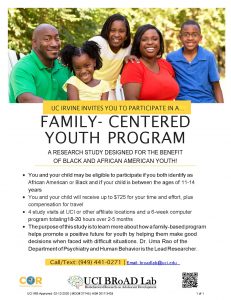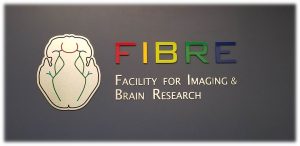Why is this study being done?
Adolescents face many challenges as they begin to gain independence and prepare for adult roles in society. Black and African-American youth experience unique challenges during this transition due to our societal structure. Dr. Velma McBride Murry is an African-American Professor at Vanderbilt University who developed a culturally-sensitive family intervention program called Pathways for African American Success (PAAS). This program helps Black and African-American youth develop life skills in overcoming “road blocks” during this challenging period and gain long-term positive outcomes.

The adolescent brain is plastic and undergoes significant remodeling. A better understanding of the brain networks involved in positive response to the life-skills program will help us to fine-tune the program and develop alternative strategies for those who do not show significant benefit.
What does this study involve?
Participants in the Life Skills Study come to 4 study visits and participate in a 6-week computer program that helps families build skills to promote a positive future for youth. Families will receive up to $725 for their time and effort, as well as compensation for mileage to/from study visits.
- Visit 1 (about 2 hours): Youth and their parent/guardian participate in questionnaires and health screenings.
- Visit 2 (about 2 – 2.5 hours): Youth participate in a practice MRI (Magnetic Resonance Imaging) scan lasting about 30 minutes, and then they participate in a real MRI scan lasting 1.5 hours. The MRI allows us to take pictures of the brain. During some portions of the scan, youth will be asked to press buttons when certain images appear on a screen. This allows us to see which parts of the brain are working on the tasks, and how different parts of the brain communicate with one another.
- 6-week computer program OR waiting period: Participants are randomly assigned to either the 6-week intervention group or to the 6-week waitlist group (this is decided by chance, like a coin flip). Participants in the intervention group will participate in weekly 1.5-hour computer program sessions for 6 weeks. The computer program encourages conversation between families about adolescent development such as career options, how to deal with peer pressure, and more. Participants in the waitlist group will not have any study visits during this time.
- Visit 3 (about 2 hours): Youth will participate in a second MRI scan lasting 1.5 hours.
- Visit 4 (about 1.5 hours): Approximately 3 months after the end of the intervention or waiting period, youth and their parent/guardian will complete some follow-up questionnaires. Participants who were in the waitlist group will then have the opportunity to participate in the 6-week intervention program, if they would like to.
Are we eligible to participate?
We are recruiting Black or African American boys and girls ages 11 – 14 and their parent or legal guardian. Because this study involves an MRI, kids with dental braces, or other metal in or on the body that cannot be removed are not eligible to participate.
To find out if you are eligible to participate, please call or text us at (949) 441-0271, or click on the button below to request a call, text, or email from a study coordinator!
Is it safe to have an MRI?
MRIs are considered very safe, and they are completely painless. They do not use radiation to take pictures the way a CAT scan or an X-ray does, and teens do not take any contrast, dyes, or medications for the MRI for this research study. The MRI scanner does use powerful magnets to take pictures, so teens are not eligible to participate if they have metal in/on their body that is not compatible with the MRI (such as dental braces, pacemakers, etc.). People who have claustrophobia (a fear of small/tight spaces) or who are very sensitive to loud noises may not want to participate in an MRI because it may be uncomfortable for them. The MRI does make loud noises as it takes pictures (beeping, knocking sounds, etc.) so participants are given ear plugs to protect their ears. Check out the video below for more information on participating in an MRI visit!
Video by Director/Filmmaker Aniya Wolfe (www.beautysceneproductions.com)
Check out our recruitment flyer, and share it with your friends!


